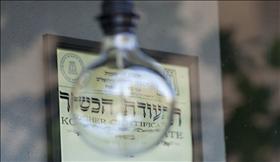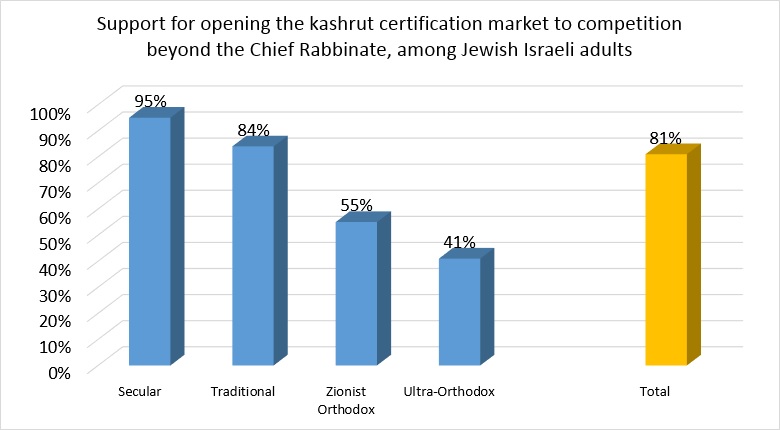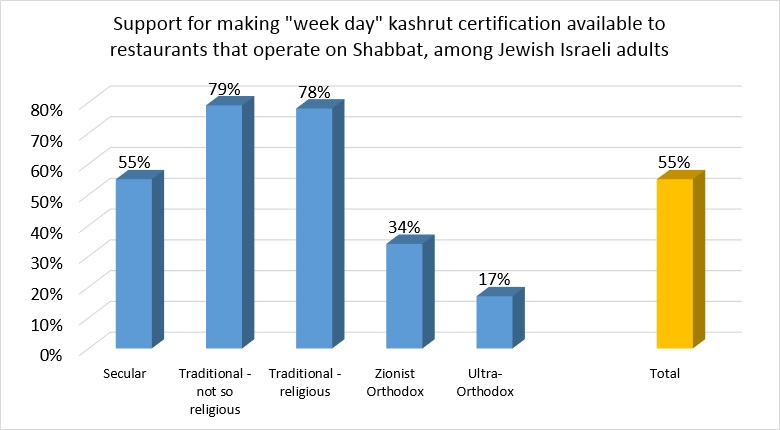Seven Supreme Court Justices hear round two of the battle over kashrut
81% support ending the Chief Rabbinate's kashrut monopoly
Most of the Jewish Israeli public supports granting kashrut certification to restaurants that operate on Saturdays (Shabbat). The High Court once again finds itself dealing with the rotten fruits of Israeli politics, who give in over and over again to the religious parties' dictates, against the wishes of the majority of the Israeli public.
23/02/2017 02:07
Tags: kosher · kashrut · kashrut certification · Chief Rabbinate

A kashrut certificate issued by the Israeli Chief Rabbinate, credit: Zeevveez, Flickr
This week, seven justices of the Supreme Court sat in judgment over round two of the legal battle regarding the Chief Rabbinate's monopoly over kashrut certification in Israel. On Tuesday, an expanded panel of seven Supreme Court justices re-heard a petition submitted by the Israel Religious Action Center that seeks to allow private entities to provide kashrut certificates, not just Israel's Chief Rabbinate.
In June of last year, the High Court rejected arguments to allow restaurants to declare themselves kosher with a kashrut license from an independent kashrut authority and not that of the Chief Rabbinate. However, the petitioners were granted the right to have the case re-heard before an expanded panel of justices.
It's too early to estimate what the outcome of this expanded Supreme Court panel will be, but Justice Esther Hayot’s remarks regarding the Chief Rabbinate’s approach were quite notable: “This approach is a bit paternalistic, which says that a person cannot work out for himself if this is important or not for him and decide to enter [the restaurant] or not,” she said during the hearing. “As long as his presentation [of the business as kosher] is correct, and he says what he does and does not do, why can’t he write it [that his restaurant is kosher]? Who is he deceiving?”
The question of kashrut is one of the key confrontational areas in the larger question of religion & state in Israel. Hiddush has been looking at this issue, both with regard to the legal questions involved, as well as the reaction of the Jewish population, and where it stands on these issues.
According to Hiddush’s most recent public opinion survey, 63% of Jewish Israelis keep kosher to some degree. Of these 48% keep kosher both inside and outside their homes, 13% keep kosher inside the home but less so outside, and 2% keep kosher primarily outside the home. 37% do not keep kosher at all. These are the findings of the Hiddush survey conducted by the Smith Polling Institute in December 2016 among a representative sample of 500 adult Jewish Israelis. The findings are consistent with those published in a Pew Center poll last year.
There is a high demand among Jewish Israelis for kosher food, but the majority oppose the Chief Rabbinate's monopoly on kashrut certification. Further, this survey reveals that the majority of Jewish Israelis support keeping eligibility for kashrut certification independent of other religious practices, such as whether or not restaurants operate during Shabbat. In order to be certified as kosher by the Chief Rabbinate, restaurants must remain closed on Shabbat.

According to the 2016 Israel Religion & State Index, conducted by the Smith Polling Institute and published by Hiddush on the eve of Rosh HaShanah, support for ending the Chief Rabbinate's monopoly has gained widespread traction with the Israeli public. 81% of Jewish Israelis support opening the kashrut certification market to competition beyond the Chief Rabbinate, and 18% support maintaining the Chief Rabbinate's monopoly. Among those who support dissolving the Rabbinate's monopoly, 52% support opening the kashrut market to professionals of all Jewish denominations, and 29% support opening the kashrut market only to Orthodox authorities.

Another survey finding highlights the degree to which the Rabbinate doesn't even represent the Jewish Israelis who adhere to religious precepts: Among Zionist Orthodox Jews, 60% support opening the kashrut regulation market to competition and ending the Rabbinate's monopoly. Even among Zionist ultra-Orthodox Jews, 41% support ending the Rabbinate's monopoly. Among voters for the non-Haredi Government Coalition parties, 81% of Likud, 94% of Kulanu, 88% of Yisrael Beiteinu, and 68% of Jewish Home support ending the Rabbinate's monopoly.
The survey was conducted by Hiddush in December 2016, reinforcing the public's opposition to the Chief Rabbinate's monopoly on matters of kashrut and demanding greater openness. In light of a proposal by MK Stern and other such demands in the past, Hiddush explored the Jewish public's reaction to the notion that restaurants that operate on Shabbat could still be eligible for kashrut certification for food sold on weekdays. 55% of Jewish Israelis supports this idea, including 78% of traditional Jews and 60% of non-Haredi Jews. Further, 70% of Likud voters, 69% of Kulanu voters, 68% of Yesh Atid voters, and even 46% of voters for the Zionist Orthodox Jewish Home party expressed their support for such a policy. The question was: "Would you support or oppose a bill that, among other things, would require the Rabbinate to issue kashrut certificates for 'weekdays' for food establishments that operate on Shabbat, on the condition that they maintain the [religious] framework for separate dishes [between meat and dairy] on Shabbat and on weekdays?"
Particularly notable is the broad support among traditional Jews and those who are concerned about keeping kosher: 78% who identify as 'traditional - religious', 79% who identify as 'traditional - not so religious', and 65% of those who keep kosher at home or outside the home support this. The highest opposition, naturally, is among ultra-Orthodox Jews (83%) and Zionist Orthodox Jews (66%).
The Supreme Court once again finds itself having to deal with the rotten fruits of Israeli politics, which give in over and over again to the dictates of the religious parties, against the wishes of the majority of the Israeli public. Unfortunately, the failures of our political leaders force the Supreme Court to enter into this arena, which is neither to its benefit, nor to the benefit of Israeli democracy, but there is no escape from the government's cynical disregard for public's will and rights. The battle over kashrut certification is particularly significant in the fight for religious freedom and equality in Israel because it illustrates growing support for fundamental values among Orthodox and traditional Jewish Israelis who realize that the Rabbinate's monopoly is damaging to the State of Israel, rife with corruption, offensive to Jewish tradition, and profoundly damaging to the public coffers.